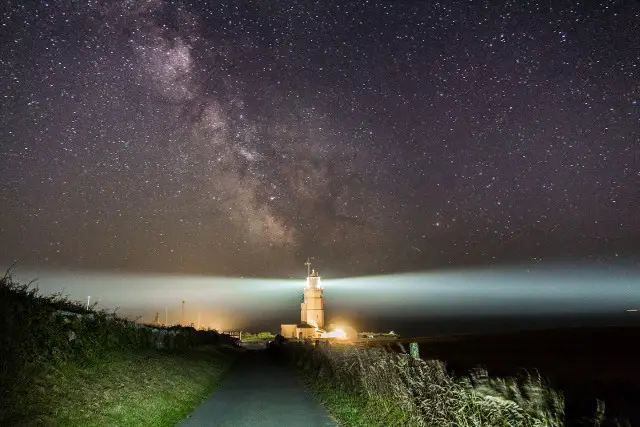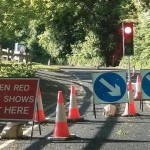Jonathan Bacon (Chair of the IW AONB) shares this joint press release from the Campaign to Protect Rural England, Isle of Wight Area of Outstanding Natural Beauty and Vectis Astronomical Society. Ed
The Isle of Wight has an exceptionally high quality of night sky that means it is potentially eligible for ‘Dark Sky’ status. The Isle of Wight Dark Sky Initiative aims to achieve Dark Skies Community Status for the Isle of Wight.
The Initiative is a joint project between the Isle of Wight Area of Outstanding Natural Beauty (AONB), Vectis Astronomical Society (VAS) and the Campaign to Protect Rural England (CPRE).
What are Dark Skies?
Dark Skies are special areas across the world where there are low levels of light pollution. When there is an absence of light pollution, thousands of stars are revealed at night, this is beneficial to the wildlife and tranquillity of an area along with providing an out of season boost for tourism.
The International Dark Sky Association awards different grades of Dark Sky Status to areas of land that are recognised as having exceptional or distinguished quality of starry nights.
Protection for scientific and cultural heritage
Dark Sky Status helps to protect these areas for scientific, natural, educational, cultural heritage and public enjoyment. Currently there are 64 Dark Sky areas around the world. In the UK these include the Channel Island of Sark, the Brecon Beacons National Park and Dumfries and Galloway Dark Sky Reserve.
An essential part of the criteria for Dark Sky Community Status is the approval of a comprehensive lighting code within the jurisdiction of the Community. As such the Dark Sky Initiative supports the motion being put forward by Councillor John Medland at the Isle of Wight Full Council Meeting on 15th November which will move the Council forward in this regard.
Seeking to preserve
Dawn Haig Thomas, Campaign to Protect Rural England, said,
“In 2016, CPRE released maps of the UK highlighting ‘Night Blight’ or excess levels of artificial light.
“The maps showed how the Isle of Wight is already one of the darkest places in the UK, which is a position we seek to preserve and even improve for the wellbeing of all species, including humans, who need darkness to survive and thrive.”
Comparable dark skies
Bryn Davies, Vectis Astronomical Society, said,
“The Vectis Astronomical Society has long been a supporter of achieving Dark Sky Status for the Isle of Wight.
“To this end we have taken measures of the sky over the Island at night using Sky Quality Meters and have shown that now the Island has a very dark sky at night over much of the area, apart from places such as Newport, Ryde Cowes and the South Coast Bay area.
“This is comparable to the darkness found in other Dark Sky Areas.”
Clear rules required
Jonathan Bacon, Chair of the Isle of Wight Area of Outstanding Natural Beauty Steering Committee, said,
“The Isle of Wight has effectively made great steps towards Dark Sky status through the new street lighting introduced in recent years. As such there is little if any infrastructure expenditure now required to pursue the application for Dark Sky status.
“What is required, are clear rules within the Council’s planning documentation. In due course these could be included in the revised Island Plan.
“However, as that is some way off and there is a risk of decisions being made in the meantime that could undermine Dark Sky status in the absence of clear local planning rules, there is a pressing need to introduce Supplementary Planning Guidance to secure the basis for the application for Dark Sky status and the economic and environmental benefits it will bring.”
Cllr Medland’s motion
By Councillor John Medland,
The Isle of Wight has a relatively high quality of night sky with low levels of light pollution which makes it potentially eligible for Dark Sky Status, an international accreditation awarded by the International Dark Sky Association. Dark Sky status has currently been granted to only 64 areas around the world.
The Isle of Wight Dark Skies Initiative is working to obtain this accreditation for the Isle of Wight. The accreditation does not rely on removing lighting but on encouraging better use of lighting. Accreditation would have many benefits in terms of preserving the environment with benefits for wildlife. There will be an economic gain from the recognition of the Island as a world class destination for amateur astronomers. This will boost tourism, particularly ‘out of season’ when the night sky is best for such activity.
To obtain Dark Sky Status an area requires a form of local lighting code. This can take the form of Supplementary Planning Guidance as used in other areas in the UK which have already obtained accreditation. Without such Guidance the quality of the Island’s night sky is at risk and the possibility of obtaining the accreditation may be lost.
Accordingly this Council recommends to Cabinet that such a Guidance document is brought into effect as soon as possible to help the Island to secure Dark Sky status and the benefits set out above
Image: © Ainsley Bennett





